india going global.indd - The IIPM Think Tank
india going global.indd - The IIPM Think Tank
india going global.indd - The IIPM Think Tank
You also want an ePaper? Increase the reach of your titles
YUMPU automatically turns print PDFs into web optimized ePapers that Google loves.
MERGERS & ACQUISITIONS<br />
<strong>The</strong> Current Scenario:<br />
Between 2005 and 2006, on a year-on-year basis, <strong>global</strong><br />
M&A volume had gone up by 37%. People who deal with<br />
corporate strategies and M&A dealmakers, think that since<br />
the <strong>global</strong> interest rates are still at relatively low levels and<br />
hedge funds have taken an active role in the recent past<br />
in M&A activities, there is a possibility that <strong>global</strong> fund<br />
managers shall continue to allocate more fund for M&A<br />
deals at least in near future.<br />
<strong>The</strong> objective of this article is to focus on the issues of<br />
M&A that require attention of professional managers having<br />
specialization in finance, law, strategies etc., since these<br />
are crucial by nature. It is the fact of life today that the<br />
banks fund M&A mainly for financial reasons realizing<br />
the need for faster growth in volume of business through<br />
inorganic route. Companies make strategic growth plan<br />
through internal operations and acquisition. When mature<br />
resources are needed right away, acquisitions perhaps make<br />
business sense.<br />
Initial Issues:<br />
Internally it should be addressed that when normally M&A<br />
drives fail to generate greater value then why at all a company<br />
should think for it By and large the reason of failure<br />
is poor post-merger integration as a result of which proper<br />
plan for such integration and accountability aspects are to<br />
be drawn up in detail at the strategic plan making stage.<br />
Before placing the matter to the Board, the CEO and his<br />
team should check whether the added resources of the target<br />
company carry any sense to the acquirer Should the<br />
acquisition be made to broaden the product line to reach<br />
a critical market Is it to address a new customer point<br />
Could the brand value of the target be a wealth creator in<br />
the hands of the acquirer<br />
<strong>The</strong>se need to be hammered out to find a logical answer.<br />
Specific issues to be examined like what would be increased<br />
capacity of the acquirer and what would the comparison<br />
look like if compared with its rivals<br />
What was or is the niche market of the target company<br />
and how did the target make value out of its overall business<br />
and is it still possible to create further value What are the<br />
operational hurdles of the target and how the acquirer is<br />
<strong>going</strong> to address such hurdles How the scale of economy<br />
shall show advantageous to the acquirer Lastly, what would<br />
be the incremental cost (interest for borrowing for M&A)<br />
vis-à-vis the incremental volume and the incremental return<br />
on capital<br />
Some Related Issues:<br />
<strong>The</strong> recent M&A deals by Indian business groups abroad<br />
and by non-resident Indians in Europe and US, is perhaps<br />
a positive response to “satisfactory underperformance” as<br />
told by late Sumantra Ghosal. <strong>The</strong>se issues are currently<br />
being deliberated upon at the management schools. While<br />
making analysis relating to M&A strategies some time, it<br />
is not uncommon that the companies forget that may be<br />
a joint venture or a strategic alliance is more flexible than<br />
an acquisition proposal. M&A is an answer for long-term<br />
need or when operations are to be integrated perfectly at<br />
many levels. <strong>The</strong> question of affordability should also be addressed.<br />
In the absence of cash available, private placement,<br />
leveraged buyout could be the source of fund. Funding by<br />
diluting stake of promoter is also not un-common beside<br />
reverse merger. <strong>The</strong> deal maker and the management of the<br />
acquirer should settle these issues upfront, because the funding<br />
model always creates an impact on the future financial<br />
performance of the target and the acquirer. At the legal front<br />
collateral agreements are important between the acquirer<br />
and the investment banker, consultants, lawyers, auditors<br />
in order to avoid confusion and unnecessary disclosure<br />
of confidential matters. <strong>The</strong> management of the acquirer<br />
should develop its team for due diligence and post-merger<br />
integration, to avoid any conflict in the process.<br />
In the absence of cash available,<br />
private placement, leveraged buyout<br />
could be the source of fund<br />
Some Observations:<br />
<strong>The</strong>re are unfortunate instances of due diligence which<br />
echoed the desire of the acquirer in the report and obviously<br />
the M&A failed to be a tool for growth of the combining<br />
entity. Due diligence have the following as source<br />
of information:<br />
1. Public information, public document etc.<br />
2. Research based on feed-back from the customers, suppliers,<br />
distributors, alliance partners, former employees,<br />
competitors, business journalists, analysts and industry<br />
experts.<br />
3. <strong>The</strong> target company, through its management accounts,<br />
interviews with management team.<br />
4. And lastly, own understanding of the acquirer from database<br />
on customer satisfaction and employee turnover<br />
rates etc, and its causes. <strong>The</strong>oretically the due diligence<br />
team should meet regularly during the due diligence period<br />
to exchange their views and findings and the leader<br />
of the team should have courage not to echo the thought<br />
of the owner of the acquirer and should carry sufficient<br />
amount of courage to arrive at a logical and bankable<br />
findings of due diligence report. <strong>The</strong> due diligence team<br />
should have ability to adjust objectives and the scope of<br />
July-October - 2007 Need the Dough<br />
79



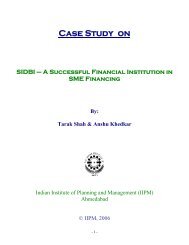
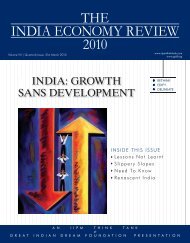
![[Feb 2008, Volume V Annual Issue] Pdf File size - The IIPM Think Tank](https://img.yumpu.com/43961117/1/190x245/feb-2008-volume-v-annual-issue-pdf-file-size-the-iipm-think-tank.jpg?quality=85)
![[June 2008, Volume V Quarterly Issue] Pdf File size - The IIPM Think ...](https://img.yumpu.com/41693247/1/190x245/june-2008-volume-v-quarterly-issue-pdf-file-size-the-iipm-think-.jpg?quality=85)


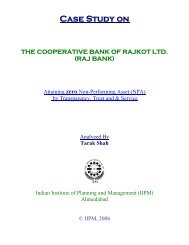

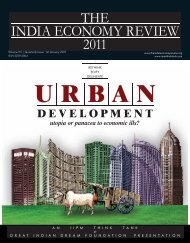
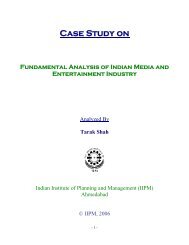
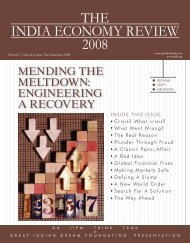
![[Dec 2007, Volume 4 Quarterly Issue] Pdf File size - The IIPM Think ...](https://img.yumpu.com/29766298/1/190x245/dec-2007-volume-4-quarterly-issue-pdf-file-size-the-iipm-think-.jpg?quality=85)
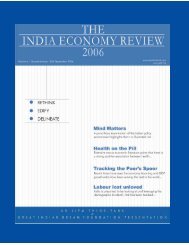
![[Volume VI | Quarterly Issue: 31st May 2009] Pdf File size](https://img.yumpu.com/27796051/1/190x245/volume-vi-quarterly-issue-31st-may-2009-pdf-file-size.jpg?quality=85)